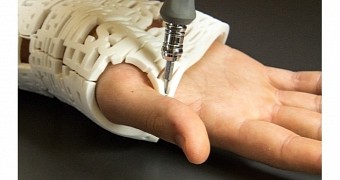Signing someone's cast can either be weird or touching, depending on the one wearing it and if the one offering is famous or not, or otherwise of interest to the person who suffered a bone injury. With #Cast, you can now sign the casts of anyone around the world.
Or at least everyone around the world who find themselves unfortunate enough to need to wear a cast and who have access to and use social networking websites like Facebook and Twitter.
Anyway, Fathom has introduced an initiative through which people can offer to sign or otherwise put their mark on someone's cast, even from half a world away.
Meanwhile, the recipient, the person who is wearing the cast or expects to be outfitted with one, can use the #Cast app to approve or reject personal messages, even set a maximum number of characters.
Fathom's modus operandi
Fathom works with companies from many walks of life. With some, it helps them plot how and when to put satellites into orbit. Others it assists in distributing devices to specific customer categories.
The #Cast app is just their latest creation that could enhance the lives and feeling of belonging of people from around the globe.
The user will set the number of characters they intend to allow on their cast, then they will choose which offers they like best.
After that, a custom fit design is generated and built by the app, after which it is delivered to the medical facility so that the cast may be created and fitted on the user by a specialist.
Where 3D printing comes in
#Cast relies on additive manufacturing and 3D CAD software to create a 3D cast model. The model is later made from a breathable nylon material, instead of plaster as is usually the case.
Selective Laser Sintering is the technique employed here, the technology most often used to print things out of metal actually. It has a far higher detail level than FDM though (making from filament), and SLA (stereolithography, growing things from resin) has material and size constraints that make it unsuitable, despite its detail level.
All in all, the #Cast is the start of a nice niche for Fathom to focus on, that of communally-created 3D prints, when it isn't doing the usual stuff (professional 3D printed development, prototyping, advanced manufacturing services, and design and engineering).
Definitely a great addition to the list of 3D printed health aids, like the Osteoid ultrasound cast and 3D printed splints.

 14 DAY TRIAL //
14 DAY TRIAL // 